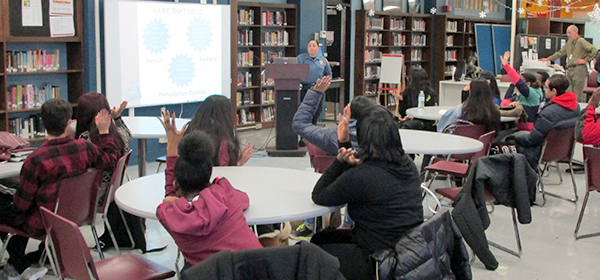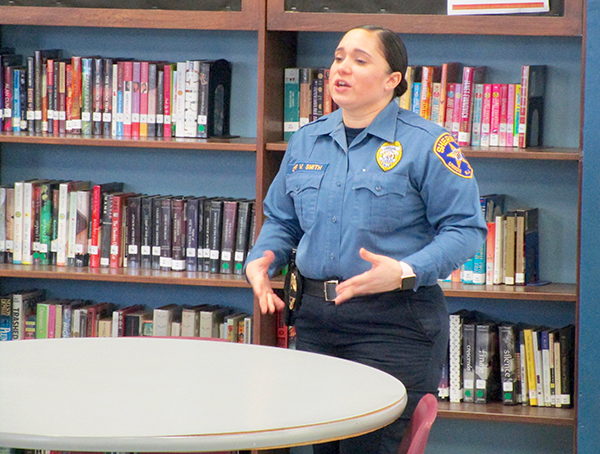Submitted by Gary Miller
Linden High School students recently got a dose of stark reality about heroin, prescription drugs, and the opioid epidemic that has hit Union County and all of New Jersey so hard.
Officer Victoria Smith, community outreach officer with the Union County Sheriff’s Office, spent several days between January 8 and 22, 2018, giving classes information about these dangerous drugs so that they could make informed decision about how to stay safe. Union County suffered 102 overdose deaths in 2017, according to the county Prosecutor’s Office. There were also 180 deployments of Narcan, a medicine used to save someone who has overdosed. Twenty-seven of those were in Linden.
Smith stressed that her presentation, which she delivers around the county to students in sixth through 12th grades, is not meant to be preachy or judgmental, but just to lay out the truth.
“You guys are going to need this information so when you go out and have to make real-life decisions, one of those things might be about drugs,” she told students of various grade levels during one of her presentations. “It might be about the opioid problem that we see now. So, if I can give you the information to go out there and make good decisions, then I’ve done my job.”
She told the students that the impetus behind her program came when a seventh-grader in South Jersey died from an overdose.
“How does a seventh-grader, thirteen-years-old, get his hands on heroin laced with fentanyl?” Smith said. “So, we in Union County decided to put a program together to make sure you guys are well informed on the opioid epidemic.”
In partnering with law enforcement, Linden Public Schools are better able to educate students on how to stay safe.
“These officers face the opioid crisis every day,” said Superintendent Danny A. Robertozzi, “so they are able get past the myths and tell our students exactly what the impacts are if they make bad decisions. Heroin and opioid abuse is a threat to our communities, but the best defense is to make sure our students are educated.”
Smith told students what some kinds of opioids are, including illegal drugs like heroin and its far more potent cousin fentanyl, as well as prescription painkillers like codeine, OxyContin and Percocet. She told them some street terms for the drugs, what they look like, and how they are packaged so students would know them if they see them.
“When they’re prescribed by a licensed physician, opioids are used to relieve pain from a surgery or medical illness,” she said. “The way we see addiction get started most often is a doctor prescribes an opioid for pain. The doctor will say, ‘Take two every six hours.’ But now the person is popping three, four, five or six, and the body is becoming dependent.
“The second way is through experimentation, especially in the younger generation. Parties, friends, peer pressure. All that stuff is associated with how we see addiction start to happen.”
Though the painkillers are legal, their abuse can lead to addiction, which in turn can lead to far more dangerous drugs.
“When you can no longer afford prescription opioids, people turn to two of the deadliest narcotics,” Smith said. “That’s heroin and fentanyl. We see people who try heroin for the first time and get addicted. Or worse, they overdose, and they pass away.”
She told students to ask her whatever questions they may have, or if they didn’t want to ask the question publicly, to talk to her after the presentation. Several of them did.
She also showed two videos, one about the impact on family and friends after a college student died from an overdose, and one a dramatization of the desperate and dangerous life of a heroin addict.
“I’m not here to tell you, ‘Don’t do this.’ I’m here to tell you, ‘This is what it is,’” Smith said. “You need to make that decision for yourself. You need to see the reality of it.”

(above) Officer Victoria Smith and Linden High School students.







